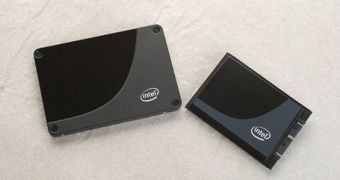Intel, currently the global leading chip maker, has recently announced that it is now shipping 160GB solid-state drives, coming to expand its offer of high-speed storage solutions. With the announcement, Intel is joining Samsung and Toshiba in a rally to deliver high-capacity SSDs that can rival hard disk drives in capacity. Unfortunately, the newly announced SSDs offered by Intel and other SSD makers are still priced way over the current price tag of hard disk drives with similar capacity.
Santa Clara, California-based Intel said on Monday that it would add 160GB versions to its X25-M and X18-M SATA solid-state drives. Up to this moment, the company has limited its SSD shipment to the smaller 80GB SSD versions. The company's 160GB SSD will become available in a laptop-friendly 2.5-inch form factor, while the 1.8-inch models, mostly designed for ultraportable computer systems, are slated to become available next month, according to Intel.
As stated by recent details, the giant manufacturer is expected to provide its new 160GB SSD for a price tag that settles at $945 for less than 1000 units. Compared to a 2.5-inch 500GB hard disk drive, which currently sells for well under $200, Intel's SSD will be considered by many an unlikely storage upgrade option. Adding an 80GB Intel SSD to an HP EliteBook 2530p ultraportable laptop ups the price of the laptop by a good $659, over the cost of a 1.8-inch 120GB HDD.
Larger-capacity hard disk drives are slowly becoming a reality, consequently eliminating one of their drawbacks in front of traditional hard disk drives. However, given their high price tag, SSDs are still far from becoming the performance alternative to fast HDDs. Samsung and Toshiba have already announced their advancements in the development of higher-capacity SSDs; the former stated back in November that it had begun mass production of the 256GB SSDs, while the latter recently said that it would be showcasing a 512GB SSD at the upcoming Consumer Electronics Show (CES) in Las Vegas, Nevada in January 2009.

 14 DAY TRIAL //
14 DAY TRIAL //